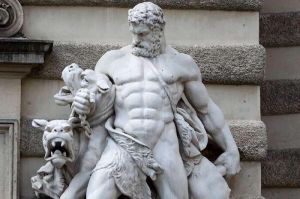Language/Modern-greek-1453/Culture/The-12-Labours-of-Hercules
The 12 Labours of Hercules[edit | edit source]
Hercules, a legendary figure in Greek mythology, was known for his extraordinary strength and daring adventures. Born to Zeus, the king of gods, and Alcmene, a mortal princess and granddaughter of Perseus, Hercules' lineage made him a demi-god. Hera, Zeus's wife, harbored resentment towards Hercules for being Zeus's illegitimate son and constantly sought to undermine him.
As an infant, Hercules displayed his remarkable strength by strangling two serpents sent by Hera to kill him in his crib. This event foreshadowed the numerous challenges he would face due to Hera's vengeance.
In his youth, Hera's machinations led Hercules to a temporary state of madness, during which he tragically killed his wife Megara and their children. Upon regaining his sanity, Hercules sought redemption and consulted the Oracle of Apollo. The Oracle decreed that Hercules must serve King Eurystheus of Tiryns and Mycenae for twelve years as penance, undertaking a series of near-impossible tasks known as the Labours of Hercules (Greek: άθλοι, athloi).
These twelve labours, steeped in danger and heroism, were linked by a continuous narrative that showcased Hercules' resilience and strength. Throughout his trials, Hercules received occasional assistance from the gods Hermes and Athena, embodying the Greek concept of pathos - the experience of virtuous struggle leading to greatness.
Hercules' Twelve Labours as Cataloged by Apollodorus[edit | edit source]
1. The Nemean Lion: Tasked to slay a fearsome lion in Nemea, Hercules used his immense strength to trap and strangle the beast, later wearing its pelt.
2. The Lernaean Hydra: In Lerna, Hercules faced the Hydra, a multi-headed serpent. With his nephew Iolaus' help, he cut off the Hydra's heads, preventing them from regenerating.
3. The Ceryneian Hind: Hercules captured the sacred deer of goddess Diana, known for its golden antlers and bronze hooves.
4. The Erymanthian Boar: He captured a fearsome boar on Mount Erymanthus using a giant net.
5. The Augean Stables: Hercules cleaned King Augeas' stables in a single day by rerouting two rivers.
6. The Stymphalian Birds: Hercules dispersed a flock of carnivorous birds in Stymphalos using magical bronze krotala given by Athena.
7. The Cretan Bull: He tamed a bull in Crete, later becoming the father of the Minotaur.
8. The Mares of Diomedes: Hercules captured the man-eating horses of King Diomedes of Thrace.
9. Hippolyte’s Belt: Tasked with obtaining the armored belt of Amazon queen Hippolyte, Hercules faced Hera's deceitful interventions but succeeded.
10. The Cattle of Geryon: He overcame numerous obstacles set by Hera to steal the cattle of the monster Geryon.
11. The Apples of Hesperides: Hercules retrieved golden apples from Hera's garden with the assistance of Prometheus and Atlas.
12. Cerberus: His final labor involved capturing Cerberus, the three-headed guard dog of Hades.
Conclusion[edit | edit source]
The tale of Hercules' twelve labours is not just a story of brute strength, but also a narrative of resilience, repentance, and the quest for redemption. Hercules' journey from a troubled hero to an immortalized figure in Greek mythology underscores the themes of struggle and triumph that resonate through centuries.
Author[edit source]
- Ευγενική χορηγία που στοχεύει να βοηθήσει μαθητές ή μη, απανταχού της Γης, που επιδίδονται στην εκμάθηση της ελληνικής γλώσσας!
- Contribution bénévole visant à aider les personnes, partout dans le monde, qui sont engagées dans l'apprentissage de la langue grecque !
- Voluntary contribution aimed at helping people, all over the world, who are committed to learning the Greek language!

